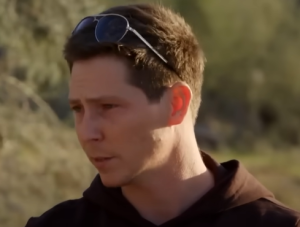Brandon Gibbs and Julia Trabina’s journey to parenthood unfolds like a reality-TV script that somehow feels all too real, a heartbeat beneath the drama and cutaways. In this latest chapter, they reveal a pregnancy that arrives after years of anticipation, fear, and a stubborn hope that refuses to be extinguished. The couple—who first crossed paths through a mutual friend in 2019, bridged a cultural chasm when Julia moved from Russia to Virginia, and sealed their bond with a wedding just a year later—now prepare to add a new dimension to their shared narrative. The camera lingers on their faces, capturing both the glint of excitement and the tremor of nerves as they speak directly to their audience: this is not a celebrity announcement designed for shock value, but a pledge to navigate the unknown together, as a team, as partners, as soon-to-be-parents.
What makes this moment compelling is not merely the miracle of a baby on the way, but the intimate truth behind the headlines: the long, winding road to fertility, the doubts that gnawed at them in quiet rooms, and the raw honesty with which they now acknowledge the obstacles they have faced. The moment Julia admits a past skepticism about motherhood—“I’m not trying to have kids right now,” a line that somehow sounds almost like a confession—lands with a weight that isn’t easy to ignore. Brandon’s unwavering hope stands in counterpoint as he speaks in quiet, steady tones about their decision to begin this journey at last. Their story is not a single hinge swinging from denial to acceptance; it’s a layered dance of timing, science, faith, and stubborn love—the kind of narrative that drama thrives on because it mirrors the unpredictable tremors of real life.
In the backdrop of their big reveal lies a truth that adds gravity to the moment: fertility struggles. The couple doesn’t shy away from the pain that came two years earlier when Julia faced medical confirmations about their future. A rushed trip to Russia, a battery of tests, medical jargon that sounded like a foreign language, and the crushing diagnosis—“I can’t have kids because of inside my body”—all of it reveals a core vulnerability. Yet the narrative does not end there. It pivots toward resilience, toward a shared conviction that family can still be built, albeit through avenues that require courage, patience, and perhaps a redefinition of what “together” means in the most intimate sense. The announcement becomes a beacon for anyone who has ever fought for a dream that seemed blocked by biology or circumstance, a reminder that love sometimes must redraw the map, reroute the plan, and trust that the final destination—part of a family built through mutual support and unwavering commitment—will still come to be.
The emotional architecture of their story is crafted through the cadence of their conversations. There are moments of levity—the playful, candid banter about “changing plans” and the twinned chorus of doubt and reassurance that comes with any major life chapter—interwoven with solemn, contemplative pauses where they acknowledge the risks and the unknowns. The pregnancy announcement itself, accompanied by stunning photos, becomes a visual manifesto: life can surprise you at the exact moment you stop planning for it, and love—when paired with perseverance—can turn a precarious road into a path forward. This is not merely a “they are pregnant” headline; it’s a portrait of two people who have learned to argue with grace, to listen with empathy, and to align their dreams even when their steps falter. Their story invites readers to watch not just for the next milestone, but for how they will translate fear into courage, and intention into action as they prepare for a family that will be shaped by two cultures, two families, and a shared vow to weather the storm together.
The ripple effects of their news extend beyond their own home. Fans—who have followed their trajectory from the moment Julia packed her bags and stepped onto affection and uncertainty—now brace for the next act in a saga that feels both intimate and universal. The pressures of reality television, the scrutiny of public life, and the inevitable questions about timing, compatibility, and ambition all collide with the raw, human desire to raise a child in a world that often feels chaotic and uncertain. In this context, their vow to “work as a team” becomes more than a personal comfort; it becomes a blueprint for navigating the complexities of modern romance, cross-cultural marriage, and the shared responsibilities of being parents in the spotlight. The couple’s acknowledgment of past friction—ranging from divergent timelines to the fatigue that accompanies long days and longer interviews—renders their current stance not as a perfected ideal but as a living, breathing plan that will continue to adapt as pregnancy progresses and the realities of parenthood take shape.
Ultimately, the announcement is a testament to faith—faith in each other, faith in the future, and faith in the unspoken belief that a family can emerge from the most imperfect, imperfectly timed circumstances. Brandon’s certainty—“one way or the other, you’re going to be an amazing mom”—is not just a line of reassurance; it’s a vow etched into the narrative’s core. Julia’s quiet resolve to embrace motherhood, even after a diagnosis that once threatened to close the door, reframes the story from one of limitation to one of possibility. The interplay of vulnerability and conviction culminates in a moment that feels like a turning point, not just for their personal lives but for every viewer who sees in their struggle a reflection of their own hopes, fears, and stubborn, hopeful persistence. As the couple prepares for the next chapter, they invite us to witness a journey that will likely be as much about growth, resilience, and love as it is about a baby’s first breath.





